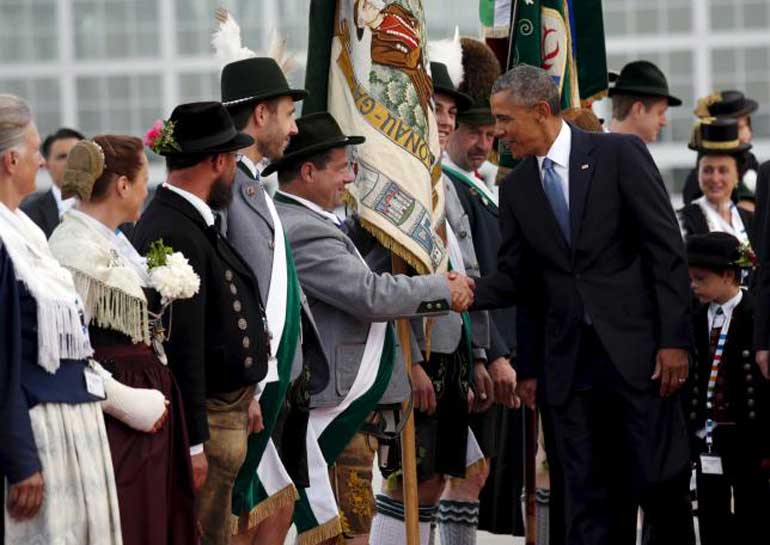Friday Feb 20, 2026
Friday Feb 20, 2026
Monday, 8 June 2015 00:00 - - {{hitsCtrl.values.hits}}

US President Barack Obama is welcomed by well-wishers dressed in Bavarian attire upon his arrival in Munich in Germany 7 June – Reuters
Germany (Reuters): Leaders from the Group of Seven (G7) industrial nations meet on Sunday in the Bavarian Alps for a summit overshadowed by Greece’s debt crisis and ongoing violence in Ukraine.
Host Angela Merkel is hoping to secure commitments from her G7 guests to tackle global warming to build momentum in the run-up to a major United Nations climate summit in Paris in December. The German agenda also foresees discussions on global health issues, from Ebola to antibiotics and tropical diseases.
But on the evening before the German chancellor welcomes the leaders of Britain, Canada, France, Italy, Japan and the United States, she and French President Francois Hollande were forced into their fourth emergency phone call in 10 days with Greek Prime Minister Alexis Tsipras to try to break a deadlock between Athens and its international creditors.
The two sides have been wrangling for months over the terms of a cash-for-reform deal for Greece. Without aid from euro zone partners and the IMF, Greece could default on its loans within weeks, possibly forcing it out of the currency bloc.
An upsurge of violence in eastern Ukraine will also play a prominent role at the meeting at Schloss Elmau, a luxury hotel perched in the picturesque mountains of southern Germany near the Austrian border.
European monitors have blamed the bloodshed on Russian-backed separatists and the leaders could decide at the summit to send a strong message to President Vladimir Putin, who was frozen out of what used to be the G8 after Moscow’s annexation of Crimea last year.
Ahead of the gathering, thousands of anti-G7 protesters marched in the nearby town of Garmisch-Partenkirchen on Saturday. There were sporadic clashes with police and several marchers were taken to hospital with injuries, but the violence was minor compared to some previous summits.
The Germans have deployed 17,000 police around the former winter Olympic games venue at the foot of Germany’s highest mountain, the Zugspitze. Another 2,000 are on stand-by across the border in Austria.
Merkel is due to hold talks with U.S. President Barack Obama on Sunday morning before the summit gets underway, with Ukraine, Middle East turmoil and the TTIP free trade agreement being negotiated between Washington and the European Union at the top of the agenda.
Obama may also be keen to hear the latest from Merkel on the Greek talks. Officials in Washington, worried that a so-called “Grexit” could hit the world economy, have stepped up pressure on their European counterparts in recent weeks to clinch a deal.
“I think waiting until the day or two before whatever the deadline is, is just a way of courting an accident,” U.S. Treasury Secretary Jack Lew said at a meeting of G7 finance ministers in the eastern city of Dresden last week.
On Monday, the summit is also due to discuss militant threats from groups like Islamic State and Boko Haram with the leaders of Nigeria, Tunisia and Iraq, part of an “outreach” group of non-G7 countries.
Merkel will also have hard work on the climate talks. She won plaudits in 2007 when she hosted a G8 meeting on the Baltic coast and convinced Obama’s predecessor George W. Bush to join other leaders in pledging to fight global warming.
This time she and Hollande, who will host the UN summit at the end of the year, need to overcome resistance from Japan and Canada. In a video podcast on Saturday, Merkel said the Paris conference could only be successful if the G7 committed to limit the rise in average global temperatures to two degrees Celsius above pre-industrial levels.
“Otherwise I don’t think there will be a climate agreement in Paris and all of the participants know that,” she said.